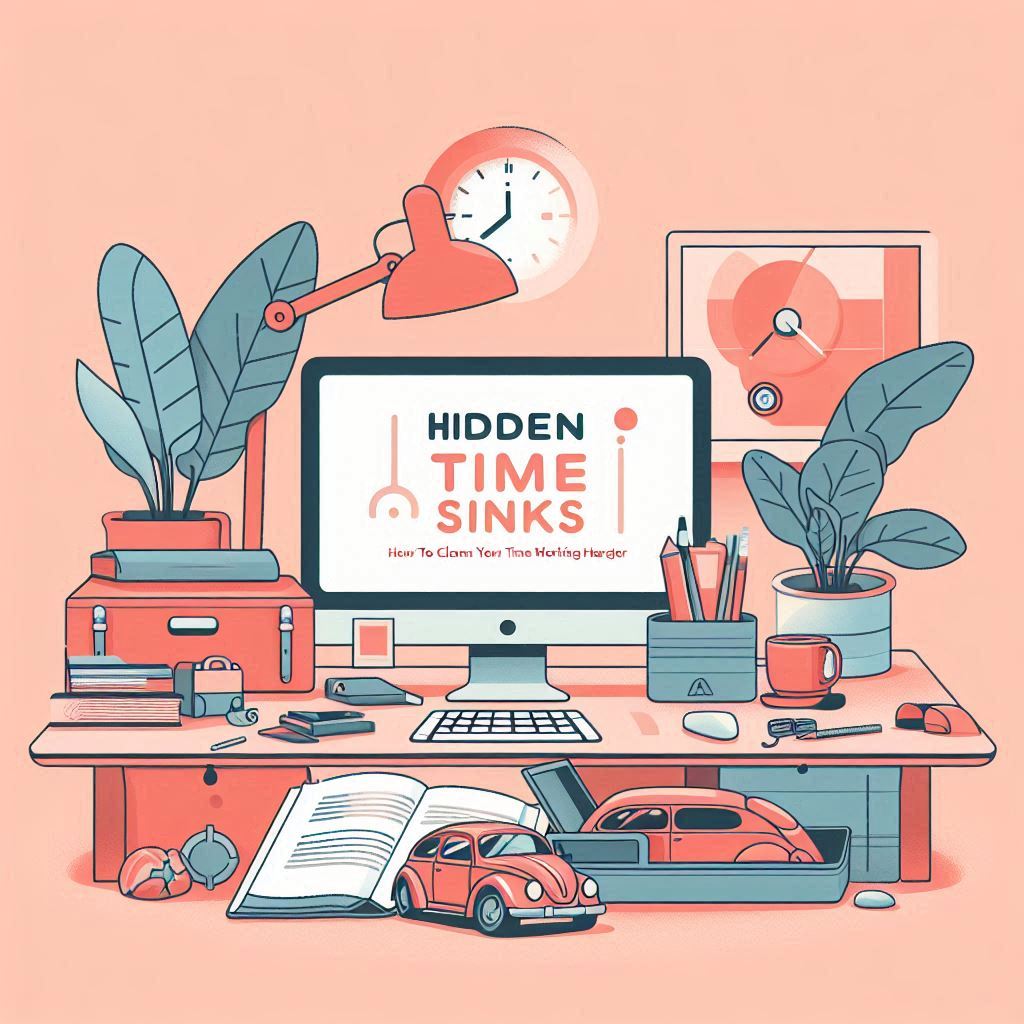
Do you ever end your day feeling exhausted, only to wonder where all your time went? You’re not alone. I used to feel the same way. I’d work all day, but by evening, I was drained and frustrated. I kept asking myself, “Where did my time go?” I tried everything—better schedules, productivity tools, and systems—but nothing worked.
Then I realized the problem: hidden time sinks. These are small, unnoticed habits that quietly waste your time and energy. They don’t add value to your day or goals, but they trick you into thinking you’re being productive.
Let me show you how I identified my hidden time sinks, why they’re so sneaky, and how you can fix them—without working harder.
What Are Hidden Time Sinks?
Hidden time sinks are habits or tasks that feel harmless but actually drain your time and energy. They’re hard to spot because they don’t feel like a waste of time. Here are some examples from my own life:
- Research Rabbit Holes
I’d start researching one small thing and end up lost in unrelated articles, videos, or forums. What began as a 5-minute search turned into an hour of wasted time. - Context-Switching Chaos
I used to jump between tasks constantly. Once, I tried drafting a newsletter, planning a trip, and tracking the stock market—all at the same time. It was a mess. I got nothing done. - Over-Checking Everything
I’d constantly refresh my email, social media, and analytics for updates. It felt productive, but it just broke my focus. - Over-Editing Instead of Publishing
I’d spend hours tweaking social media posts, chasing perfection that didn’t exist. The fear of “not good enough” kept me from hitting publish. - Half-Done Tasks Piling Up
I’d start projects or ideas but leave them unfinished. These half-done tasks cluttered my mind and drained my energy, even when I wasn’t actively working on them.
Why Do We Fall Into These Habits?
Hidden time sinks are dangerous because they don’t feel like a waste of time. Here’s why we keep falling into them:
- The Brain Loves Quick Rewards
Checking notifications or scrolling social media gives us a tiny hit of dopamine (the “feel-good” chemical). It feels productive, but it breaks our focus and wastes time. - The Perfectionism Trap
We over-edit, over-research, and over-plan because we’re afraid of being judged. But perfection doesn’t exist—it just keeps us from finishing. - Open Loops Drain Mental Energy
Unfinished tasks (like half-written notes or unanswered emails) don’t just sit there. They create mental clutter and drain our energy, even when we’re not working on them. - Decision Fatigue Slows Us Down
Constant small decisions—“Should I reply to this email?” or “What should I work on next?”—tire out our brain. Over time, this makes it harder to focus. - The Illusion of Productivity
We mistake “busyness” for progress. For example, spending hours organizing notes feels productive, but it doesn’t actually move us forward.
How to Fix It: 5 Actionable Strategies
Here’s how I tackled my hidden time sinks. These strategies are simple but powerful:
- Spot the Pattern
Track your time for 2-3 days. Write down everything you do, no matter how small. This helps you identify where your time is really going. - Close Open Loops
Finish what you start. Use the 2-minute rule: if a task takes less than 2 minutes, do it right away. For bigger tasks, break them into smaller steps and tackle them one at a time. - Time Blocking
Set aside specific chunks of time for specific tasks. If you can’t finish in the time block, stop and reschedule. This keeps one task from taking over your whole day. - Prioritize Deep Work
Dedicate 1-2 hours daily to focused, uninterrupted work on your most important task. Turn off notifications and eliminate distractions. - Reduce Small Decisions
Set defaults for your day. For example, have a fixed schedule for writing, working out, and relaxing. Use a “default” playlist for deep work. Fewer decisions = more focus.
Start Small: Your First Step
Ready to reclaim your time? Start with a 10-minute “time sink audit.” At the end of the day, ask yourself:
- What habits or tasks drained my time and energy?
- What felt productive but didn’t actually move me forward?
Pick one hidden time sink and apply one of the strategies above. For example, if you’re constantly checking emails, set specific times to check them instead of refreshing all day.
Final Thought
Hidden time sinks are sneaky, but they’re not unbeatable. By spotting them, understanding why they happen, and taking small steps to fix them, you can reclaim your time and energy. Remember, it’s not about working harder—it’s about working smarter.
So, what’s your biggest hidden time sink? Share it in the comments below. Let’s help each other reclaim our time and focus on what truly matters!



